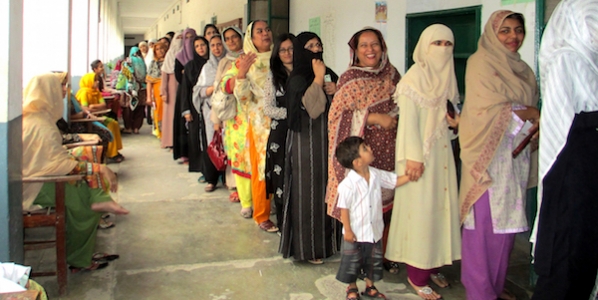 As we look to today’s elections, there have been substantial promises made by all parties. Whilst Asad Abbasi argues in this feature length special that manifestos are unlikely to sway electoral outcomes, if these ordinary promises are fulfilled, much can change for the citizens of Pakistan.
As we look to today’s elections, there have been substantial promises made by all parties. Whilst Asad Abbasi argues in this feature length special that manifestos are unlikely to sway electoral outcomes, if these ordinary promises are fulfilled, much can change for the citizens of Pakistan.
The political slogans drip with emotive sentiments. ‘Honour the vote’, says Nawaz Sharif. Bilawal Bhutto Zardari asks people to honour the promise made to his mother, Benazir Bhutto. Imran Khan promises a corruption-free, honourable Pakistan where people from around the world would seek jobs. If emotive sentiments, mixed with religious fervour, fill political rallies, campaign on social media scuttles through ad-hominem attacks and edited videos. Absent from political rallies, social media and corporate news media is detailed policy analysis.
Perhaps, the absence of serious policy discussion stems from the absence of neutral institutions. Or, that the awful familiarity that political parties ooze bear complacent political analysis. Or because everyone understands that promises made in election manifestos are neither binding nor worth discussing.
Looking at election manifestos, at least in Pakistan, seldom indicates what will transpire when a party gains the executive and the legislative authority. Accountability of the promises made before elections may be the least of the troubles for a political party in a country with constant flux and change. However, manifestos play a vital role in understanding the intents and promises of a political party as well as to what appearances a political party wishes to maintain.
By focusing on their development policy, I aim to compare and analyse manifestos of three main political parties: Pakistan Muslim League-Nawaz (PML-N), Pakistan People’s Party (PPP), and Pakistan Tehreek-e- Insaf (PTI).
China Pakistan Economic Corridor (CPEC)
China Pakistan Economic Corridor (CPEC) stands as the most important economic and political project in Pakistan. Not surprisingly, CPEC remains the chief concern of all three manifestos. Despite lack of clarity on specific details of the project, all parties continue to support the project.
Even though PPP avoids specific policies about CPEC, the manifesto credits the party for ‘paving the way for’ CPEC. PML-N manifesto, however, reminds everyone that it was their government that ‘made it possible for Pakistan to become a significant part of OBOR through CPEC’.
The statement of these two parties contradict the information available on CPEC INFO, a government run website which confirms that ‘China conceived the idea of CPEC’.
Though PTI supports CPEC, the party manifesto raises concern over the monopoly of Chinese businesses in the projects. PTI calls CPEC a ‘golden opportunity’ but wants to ‘encourage a shift towards partnerships for project completion’ and ‘that local Pakistani businesses’ make significant contribution in CPEC.
On Taxation
All three parties affirm that tax to GDP ratio is too low. To increase this ratio, the three parties promise to increase the tax base, propose tax cuts for businesses and reform Federal Board of Revenue.
PML-N provides the clearest policy for the merchant class. After reducing the corporate tax rate from 35% to 30% between 2013-2018, PML-N now promises to further reduce the corporate tax rate to 25%. PTI wants to ‘champion sustainable initiatives to reduce taxes on businesses’. PPP proposes ‘tax incentives’ for the digital industry ‘to facilitate its growth’.
All three parties vow to curb tax evasion either through asset declaration programs, as promised by PML-N or through ‘track and trace softwares’, as suggested by PPP. However, the intent of PML-N and PPP on curbing tax evasion calls for great scepticism as Nawaz Sharif and Asif Zardari are facing charges over offshore accounts and money laundering. However, the timing of the prosecutions against Sharif and Zardari, just before the elections, raise concern of election interference.
Water Crisis
Pakistan faces serious water crisis and could possibly dry up by 2025. This requires series of urgent actions to avert the disaster.
According to interviews conducted by The Third Pole, PPP is the only major party which considers water crisis as Pakistan’s biggest challenge. Among the three parties, PPP manifesto treats water scarcity in detailed manner specifying barrages to be modernised, introducing desalination projects, and specific irrigation technologies to curb water scarcity. However, PPP manifesto avoids the topic of building any dams.
The PML-N manifesto mentions water scarcity but ignore the oncoming water crisis. The manifesto, however, lays out detailed projects including building of a Diamer-Bhasha dam. Similarly, PTI promises to build Diamer-Bhasha dam as well as to build ‘small dams across Pakistan to conserve water’.
The most spectacular action to control water scarcity is taken by the Chief Justice of Pakistan who started crowdfunding scheme to built Diamer-Bhasha and Mohmand Dam. The Chief Justice appeals the public to ‘contribute in this national cause generously’. Private organisations, Army, sports celebrities have all publicly declared to fund this program. Well intended, but a ‘joke’ of a policy. Even if Rs 20 Million are collected each day, Khuram Hussain writes, it would take 200 years to get total funding for this project.
Health Insurance
PML-N and PTI propose to extend their health insurance schemes nationwide. PPP manifesto omits any health insurance scheme.
PML-N promises to increase the reach of its health insurance card. The scheme primarily targeted to 23 districts, and later included 15 more district. Now, in its next phase, party proposes to cover ‘100% of districts’. PTI’s health insurance which covers Khyber Pakhtunkhwa, began with low income households and then extended to government employees. Just like PML-N, PTI also proposes to extend the scheme country-wide.
PPP’s manifesto does not include any health insurance scheme. Instead, PPP manifesto chooses conditional cash programs for mother and child support programs. PPP will continue to rely on its Income support programme, BISP, which provides ‘some relief’, according to one study, for those who eventually receive it.

Women queuing to vote in Ralwapindi during Pakistan’s last elections. Photo credit:Rachel Clayton/Department for International Development, Wikimedia Commons, CC BY 2.0.
Biggest commitments:
PPP: Rights for Women working in Agriculture
One of the real highlights of PPP manifestos is its promise to register and recognize women working in the agriculture sector. Along with providing crop insurance to small farmers, providing legal recognition to women working in agriculture is an important step to address problems affecting rural population of Pakistan. According to the Labour Survey 2012-13, over 70% of working women work in the Agriculture (along with Forestry and Fisheries) sector. In Sindh, around eighty percent working women toil in the agriculture sector. PPP claims that with legal recognition and registration women agricultural workers would be entitled to individual pay and minimum wages, government funded entitlements including maternity leave, ownership of assets and other services.
PTI: Ten Million Jobs
The most ambitious project announced by PTI is its ‘10 Million jobs’, and five million homes, scheme which the manifesto, without going into any specificity, would be through the ‘labour exchange…(which can ) effectively regulate the labour market..’ and through curbing ‘corrupt and other illegal practices’.
According to 2017 census, Pakistani population is about 207 million, of which 111 million are currently in the labour market. Creating ten million jobs translates into around 9% increase in the jobs growth. In one of his speeches, Imran Khan suggested that it will be a challenge to implement everything their manifesto promises. Nothing would be as challenging as to fulfil this commitment. With low educational standards, and a mainly agricultural economy, it would be difficult in the first full term to diversify an economy enough to create such large number of jobs. Even if PTI ends up achieving half of the jobs promised, it would be a success.
PML-N: Eliminate poverty by 2030
Borrowing this commitment from Sustainable Development Goals (SDGs), which proposes to end poverty ‘in all forms and dimensions by 2030’, PML-N promises to eliminate poverty in Pakistan by 2030. This will be achieved in accordance with PML-N’s philosophy: through growth, infrastructure and private investment. The effective of such a philosophy may not get Amartya Sen’s approval, yet majority in Punjab, at least in the past, voted for this philosophy. With the growth target of 7% and industrial growth rate of eight to ten percent, PML-N plans to create the ‘foundation of modern infrastructure’ through the public-private partnerships. For the low income households, interest free loans, or extremely cheap credit will be available through mutual banks and venture capital funds. Those not entrepreneurial enough are promised ‘mass employment’, for others the promise of five acres of land exists.
The final word
PPP manifesto talks in detail on gender issues and foreign policy. PPP, unlike the other two parties, gives a detailed view of its foreign policy and how it plans to maintain relations with USA and India. Economic and development policies at the national level are either absent or insipid. Once inspirational slogan ‘Roti, Kapra aur Makan’ (food, clothes and shelter) continues to be PPP’s slogan even today. If a political party uses the same slogan to inspire supporters after fifty years, then it has arguably either failed to fulfil its commitment, or is slacking in ideas. The PPP must therefore, address its approach, politics and performance.
The PML-N manifesto reads like an extremely well-researched Powerpoint presentation. PML-N plays to its strengths: build infrastructure, promise growth, and attract businesses. Just like in 2013, PML-N manifesto says almost nothing about political relationship with USA. With India, PML-N lays out both options: support military to deter ‘India’s colossal military build-up’ as well as ‘dialogue with India…on the basis of equality’. In the light of ongoing corruption proceedings, promises on reforming judiciary and curbing corruption appear a sham in the manifesto. How the voters of Punjab feel about the corruption charges will dictate the outcome of the upcoming elections.
Finally, PTI says little about USA and not much about India. However, the manifesto calls for a ‘bilateral strategic dialogue with India… as to prevent a spiralling nuclear arms race in the region’. This is a welcome statement for any reasonable person. PTI claims credit for the disqualification and eventual imprisonment of Nawaz Sharif. This should raise their hopes of success. On the other side, the Gallup Poll conducted after the accountability court decision shows that 42% people still think that the decision to jail Nawaz Sharif on corruption charges is wrong. In terms of elections, where above 30% of votes could win a majority, this is a high number and should concern PTI.
Today, as citizens come out and vote for the political parties, promises made in manifestos will not sway the election results. But, post elections, holding the winning party accountable for the promises made, is an incontestable step towards that elusive, slippery and often fragile thing called democracy.
This post gives the views of the author, and not the position of the South Asia @ LSE blog, nor of the London School of Economics. Please read our comments policy before posting.
About the Author
 Asad Abbasi has a Masters degree in Political Economy of Late Development from LSE. Currently, he is researching conceptual frameworks of development.
Asad Abbasi has a Masters degree in Political Economy of Late Development from LSE. Currently, he is researching conceptual frameworks of development.







